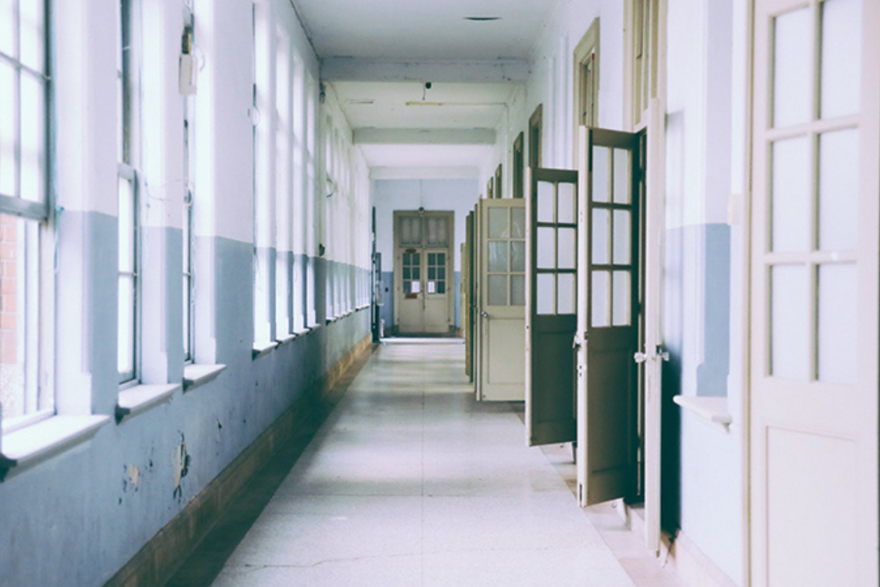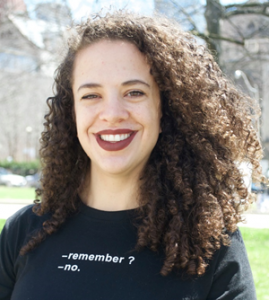Learning to Love Your Mistakes (Part 1/2)

This is the first part of a two-part series on perfectionism by Soraya Gallant. Soraya is our coop student from Ryerson University in Toronto; I like to call her our magic internicorn. She swooped in on our digital team at the beginning of May, and immediately started rocking it.
When I asked Soraya if she’d like to write a letter to you, she said yes — and then proceeded to craft this super smart, beautiful essay about her experience as a writer in academia. If you’re an academic (or a recovering academic), I think you’ll especially love her piece. (You can read part 2 here.)
xo,

 Soraya Gallant is a student of Literature and Art History, a writer, artist, and local village witch from New Brunswick, now living in Toronto. She began working with the Sarah Selecky Writing School in late April 2018 as part of her Master's in Literatures of Modernity at Ryerson U.
Soraya Gallant is a student of Literature and Art History, a writer, artist, and local village witch from New Brunswick, now living in Toronto. She began working with the Sarah Selecky Writing School in late April 2018 as part of her Master's in Literatures of Modernity at Ryerson U.
Soraya hopes that you like this vulnerable piece she wrote and will offer her a job within the literary, publishing, or arts and culture sector in Toronto because of it. Mostly because she has to prove she won't end up just a well-read barista, but also because she needs to pay her rent. (Also because it's The Dream™.)
Although she has a terrible social media presence, you can communicate with her on Instagram @xxsoraya; Twitter @fosfene; or Facebook, if you can find her.
Permission to Fail: Or, Learning to Love Mistakes
I just received my Master’s in Literature. I am 26 years old, and I have started every September since kindergarten in school — even the two years between my bachelor and my master’s degrees were spent teaching abroad. School is a world in which I am achingly familiar; I’m comfortable within it, I know how it operates. But I wasn't exactly excited to be graduating, again. I’m exhausted. I was ready for it to happen, for it to be over, but only because I’m tired. Being in that environment does something different to my brain, I’ve come to see. It isn’t harmful, but it isn’t helpful.
It triggers a maddening desire for perfection.
I spent this year not allowing myself to make mistakes. If one naturally occurred and I faltered, I wouldn’t stop taking it out on myself. It’s a personality flaw: I am my own worst critic. I think a lot of writers are. It’s a lot, isn’t it? To try to bend entire languages to our will, to put in words the inexplicable, to make the singular feel global? If you are writing what it is you want to read, you’re almost obligated to hold yourself responsible for what you’re saying. But, you are not obligated to do any of it perfectly. This is what I keep forgetting.
If you’re like me, then you’ve also cursed yourself for the ‘lack’ (which, spoiler-alert, exists only to you). Whether it’s the lack of the right word (or words), or a lack of focus, a lack of time, a lack of patience, a lack of ease, a lack, a lack, a lack—there’s always something. But it doesn’t have to be that way. We can both stop thinking so negatively and let go of those insecurities if we address them honestly.
After much recovering thought I am here to tell you that it is good, okay, and necessary for you to make mistakes.
You deserve to know that it’s okay to make mistakes because I spent every moment since September bullying myself into believing that I couldn’t.
I thought that the time of games, practice and learning—especially in, you know, an institution for learning—was off-limits. But it isn’t. Living is learning. Writing is living twice; and it’s a constant education.
When did you stop being comfortable making mistakes? When did you stop seeing them as learning opportunities?
Can you pinpoint the moment in which you cared more about getting everything right the first (or only) time?
Somewhere along the line, I felt school changing my perception of learning. It went from “I don’t know; I can question and make mistakes until I know better,” to “I must prove that I understand this flawlessly, to show I have learned.” I cannot make any blanket claims that school only perpetuates some bullied idea of perfection; a weird cocktail of a desire to impress, plus competitive friends, plus institutional academia changed my belief that it was okay to be corrected. I couldn’t stand correction or critique because that meant that I had done something wrong, that I was wrong.
If I wasn’t achieving perfection, I wasn’t working at my full potential. It was 50% my own fault, 50% a school culture that skewed my perception into thinking that making mistakes is somehow inexcusable. The longer I stayed in that mentality, the more petrifying making mistakes became. I was now the person who equated her entire self-worth to a grade, a note, a commentary about perfection. Those feelings were also compounded by being young and being female, which to the world means being infallible.
It’s the worst.
It’s the worst.
Maybe you’re like this, too? Maybe I’m not totally alone in this feeling. I’ll tell you what I’ve been trying to coach myself toward: you can learn to make mistakes again, and it’ll be comfortable. I believe in you. I want you to. I want me to.
It sounds simple, but the best way to determine why you won’t let yourself fuck up a little is to investigate why. So, get comfortable and get ready to do a little emotional unpacking, because we gotta get honest about the heart of the issue.
If we’re going to make mistakes together, let’s do it right.
It took becoming a teacher, rather than being a student, to understand that making mistakes is important.
I needed freedom from two things: my own ridiculously high standards of self, and a scrutinization of my work by others which I determined was a commentary on my worth and person. It took a lot of late nights of catatonic ceiling-staring to realize this. (Even now I am overthinking what I just wrote and want to delete it.)
So what fuels your resistance to mistakes? Be honest with yourself. You have to face it so you can understand it.
Is it a high standard of self, a fulfillment of perfection, that still seizes you?
Is it imposter syndrome? In which you believe that unless you are flawless you don’t deserve to be here? The pervasive feeling that, regardless of past successes or accolades, you’re really a fraud and failure who will eventually be exposed?
Is it the idea that someone, somehow, will read between the lines and see what you lack? That somehow, they’ll be able to ‘see’ what you missed and determine that they’ve been shortchanged?
Take a breath.
Think about your reasons and fears, write them down, ruminate on them without being hurtful towards yourself. Recognize the thing that is preventing your growth. Read part 2 now.
— Soraya Gallant, Toronto, 2018

6 comments
Leave a comment